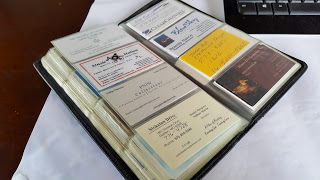


My Monday morning observation when deep cleaning points to modular and modular elevators. When going through my desk in what should be an annual ritual, but too often neglected, I ran across an interesting item. Buried amongst the broke watches, a plethora of wires that go to who knows what devises and batteries (none of which still held a charge), I found a true vestige of the past; the old business card folder.
I remember wanting one when I first graduated from college as it was considered a true and genuine indicator that you were in business, much like the now rare, rigid leather briefcase. The folder was unique as it was a single place to put all of your valuable leads and contacts. It was one step above the old Rolodex as it was leather bound and portable.
I paged through the clear plastic sleeves of cards chuckling over the graphic design style of the various rectangles of 100% rag, 16 point stock that populated the folder. Each was a prized bundle of information I had collected over time and was once held dear, like a Stan Musial baseball card, but now I noticed how few were even still relevant. Businesses had closed or changed names, people had long since moved on or the information was out of date with AOL email addresses and FAX numbers prominently displayed.
But the cards, yellowed with time, were not the funniest part of what I discovered from my perspective. It is the very notion of keeping a catalog of cards categorized based on business type and then alphabetized all in a literal folder. The time for that kind of system has declined to the point of uselessness, worth little more than short lived amusement. That is why, despite a couple decades of usefulness, it found itself shoved to the rear of an over-packed desk drawer.
A better system for keeping track of people and business connections has emerged and in honesty leaves the old folder in the dust and ultimately in the circular file.
I have seen that change too in the elevator industry. There was a time not so long ago that the big elevator companies held a universal monopoly and if you were going to construct a low or mid-rise building you had to pay homage, live within their timelines and buy what they were selling. Thank goodness the old stick-built alternative is due for the dustbin of history just like my old business card folder.
Now if you want a high-quality commercial elevator you simply have to call MEM or email them for FastTrack numbers. Once you place your order you can break away from the control of the elevator industry for good. They no longer can dictate what you can do on your job site, building project or pocketbook. You will be free to schedule elevator work when you want it done, not the other way around. Free to choose who you want the elevator maintenance company to be with a fair contract, not one laced with automatic increases and non-proprietary parts. Deep cleaning indeed.
The barnacle encrusted elevator industry is and will fight back, but the march of time is lined up against them and ultimately modular will be the first and best choice for everyone. Not because it is new (it has been around for a couple decades now), but because it is a better solution. Faster, smarter, greener and can be less expensive.
That can all be said because building a hoistway in a factory, out of the elements and off site means higher quality, truer construction and no delays. Then putting all of the elevator components in the the hoistway while it is horizontal means no safety concerns of lifting heavy parts. The wiring goes faster and the cab is built to more exacting specifications. Just better.
So engage in a little deep cleaning and clean out your desk of all those old drawings, plans and specifications and get ready for the future with modular elevators.
| Thank you for Signing Up |
